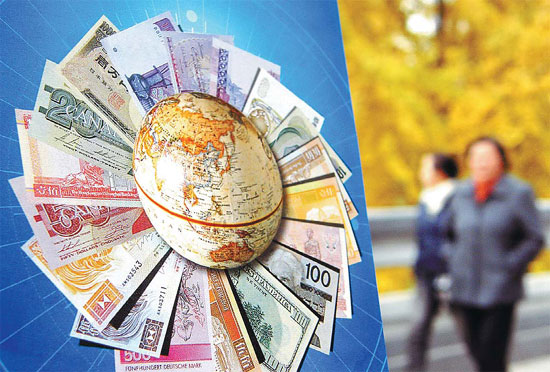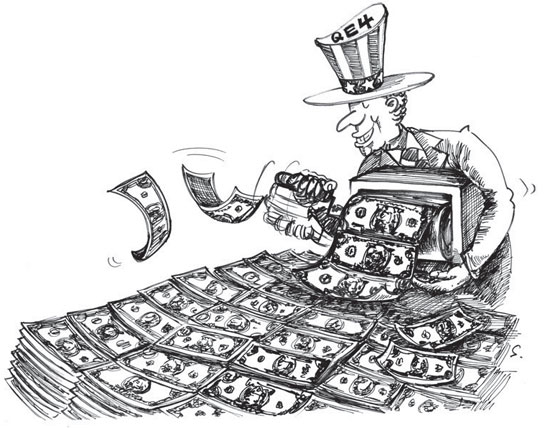Dollar dilemma as greenback value falls
Updated: 2013-02-25 05:55
By Chen Jia (China Daily)
|
||||||||
|
A billboard advertising foreign currencies in Shanghai. US Treasury bonds accounted for 36.4 percent of China's $3.31 trillion foreign exchange reserves on Dec 31, according to the People's Bank of China. The State Administration of Foreign Exchange announced last month that a new office called SAFE Co-Financing had been launched to handle trusted loans based on the country's foreign exchange reserves. Jing Wei / For China Daily |
Economists ponder how to ensure safe returns from foreign reserves
A burden or a benefit? That is the question economists were asking over the Spring Festival about China's current high level of US government debt.
The Treasury International Capital report released by the US Department of the Treasury on Feb 15, a week after Chinese New Year's Eve, showed that China remains the largest foreign creditor of the world's largest economy.
Despite the continuous depreciation of the US dollar against the yuan, China bought $19.7 billion of US Treasury bonds in December. In November it bought $200 million. Its total holdings of United State's government debt are now $1.2 trillion, according to the US Treasury Department.
The People's Bank of China, the nation's central bank, said $1 was equal to 6.28 yuan on Feb 18. The exchange rate against the dollar was 6.29 yuan at the end of last year. In other words, fewer yuan are needed to buy a dollar. In 2012, the yuan rose 0.25 percent against the dollar.
US Treasury bonds accounted for 36.4 percent of China's $3.31 trillion foreign exchange reserves on Dec 31, $130 billion up from a year earlier, according to data from the central bank on Jan 10.
China's investment amount in US government debt was $1.15 trillion at the end of 2011, 36.2 percent of the total foreign exchange reserves of $3.18 trillion, the PBOC reported.
Together with other dollar-denominated investment products, such as certain corporate bonds, the proportion of US dollar debt is almost 70 percent of China's entire foreign exchange reserves.
A heated discussion developed among senior economists and scholars on Sina Weibo, a Twitter-like Chinese Internet platform, while most Chinese people were busy sharing family photos and feasting during the year's most important festival.
How to make better use of the world's largest biggest foreign exchange reserves became the core issue. Is it still best to continue to expand holdings in US government bonds?
"The huge amount of reserves in US dollars could be transferred into residents' pockets or used to launch special investment funds to help Chinese enterprises expand overseas," wrote Qiu Xiaohua, the chief economist of Minsheng Securities Co, in a posting on Sina Weibo on Feb 14.
"A third approach would be to use a part of it as an international development fund to support economic growth in undeveloped regions, such as some African countries," Qiu added.
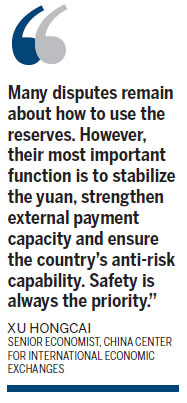
Xi Junyang, deputy director of the Shanghai University of Finance and Economics Center for Financial Research, disagreed with distributing the reserves to individual residents or spending it in China, which would lead to serious inflation.
"The foreign exchange reserves come from overseas. They can only be used for external payments," Xi said.
"The most important thing is to improve the international balance of payment, rather than finding the ideal way to use the foreign exchange reserves," said Chen Yuyu, an associate professor with the Guanghua School of Management at Peking University.
The central bank may need to set up new institutions for foreign investments based on the reserves, he added.
The central bank could launch a special account overseas in which it could invest the foreign exchange reserves. Any returns could be added to China's social security fund, said Guan Qingyou, deputy head of the Research Institute at Minsheng Securities.
An official from the State Administration of Foreign Exchange announced on Jan 14 that a new office called SAFE Co-Financing had been launched to handle trusted loans based on the country's foreign exchange reserves.
The main duty of the office is to seek out new channels in which to invest the reserved capital. "It will be an important element in innovating the use of the foreign exchange reserves to avoid their value falling," a SAFE statement said.
The "innovation" will be guided by market-oriented rules and be controlled under a strict risk-management system, the official pledged.
Xinhua News Agency reported the new office had already started pilot work before the announcement. SAFE provided the capital and entrusted the China Development Bank to lend money to Chinese enterprises aiming to expand their business overseas.
"China Development Bank can decide the loan's interest rate, length of maturity and total amount, while SAFE will take all the risk," the official said.
The investment return of the entrusted capital from foreign exchange reserves is expected to be higher than the return on US Treasury bonds, especially under the US quantitative easing policies in which the US effectively prints more money, thereby reducing its value, analysts said. However, it would come with higher risks.
Previous failures of Chinese enterprises' overseas investment projects are a warning to the central bank to ensure it maintains the safety of the foreign exchange reserves as its foremost task.
"Many disputes remain about how to use the reserves. However, their most important function is to stabilize the yuan, strengthen external payment capacity and ensure the country's anti-risk capability," said Xu Hongcai, a senior economist with the China Center for International Economic Exchanges, a government think tank.
"Safety is always the priority," Xu said.
However, it may now be a good time for China to reduce its holdings of US Treasuries because the devaluation of the dollar has further eroded the value of the foreign exchange reserves, said Xu.
"The increasing money supply in the US is leading to depreciation of the dollar and helping to dilute its debt as the US tries to solve its fiscal problems. As a result foreign creditors will suffer huge losses."
The yuan appreciated by 0.25 percent against the US dollar during the past year to 6.2855 at the close on Dec 31. It hit a 19-year high of 6.2216 on Jan 9, according to the China Foreign Exchange Trade System.
The relatively low interest rates globally currently provide opportunities to shrink China's investment in US government bonds. "A modest reduction will not hit the US bond market," Xu said.
He suggested China's central bank should readjust the asset structure of the foreign exchange reserves and encourage commercial banks to apply for foreign exchange loans to support the direct investment of businesses in European countries and the US, or import high-tech products.
Total foreign exchange reserves expanded by about $130 billion last year over the figure for 2011. It was the slowest annual growth since 2004, the PBOC said. In 2007, the foreign exchange reserves rose by $460 billion, its fastest ever growth.
Lian Ping, chief economist with the Bank of Communications, said a decrease in the international payment surplus and a more freely fluctuating exchange rate for the currency would have resulted in a slower increase in China's foreign exchange reserves.
"The current account surplus was less than 3 percent of the gross domestic product in 2011. It was 10 percent in 2007," said Lian.
A report from the Bank of Communications predicted that in 2013 the amount of China's foreign exchange reserves may remain between $3.3 trillion and $3.4 trillion.
"The fast growth trend may have ended, replaced by a modest and stable increase, which can help to reduce the pressure for currency appreciation and stabilize the exchange rate," the report said.
Investment in US treasury bonds was "unavoidable", said Qu Hongbin, the chief China economist with Hong Kong-based bank HSBC.
"Compared with investment products that are denominated under other main currencies, the dollar-dominated assets still generate higher and more stable returns," Qu said.
"I am confident with SAFE's pilot work to seek better ways to diversify investment of the reserves," he added.
The top manager of China's sovereign wealth fund, Chairman and Chief Executive Officer of China Investment Corp Lou Jiwei, said US government bonds are still safe assets right now, but the continued low interest rates in the US had decreased expected returns on the investment.
China will continue to buy US Treasury bonds, although the future gains from the investment don't look promising, according to Lou, who is a former vice-minister of finance.
According to the US Treasury Department, by the end of December, foreign creditors held $5.56 trillion in US debt, an increase from $5.54 trillion in November. It was the 12th consecutive monthly growth.
Japan invested an additional $2.5 billion in US government bonds in the last month of 2012, $1.6 billion more than it invested in November. The December injection raised the total amount of US debt for Japan to $1.12 trillion, maintaining its position as the second largest foreign net US creditor, the US report said.
It seems overseas sovereign investors have not yet been scared by the warning signals of US fiscal problems. They continue to show confidence in US future economic development through adopting more long-term credit.
The rush by China and Japan in adding to their US debt came just before an agreement achieved by the Democrats and Republicans in January aimed at sharply cutting the budget deficit, known as the "fiscal cliff".
The two US parties agreed to cut about $85 billion of spending starting on March 1, which is expected to hit various US governmental departments this year.
The US Congressional Budget Office said on Feb 5 the US budget deficit will drop below $1 trillion this year.
The office predicted that the fiscal tightening may slow economic growth to 1.4 percent by the end of this year, causing the unemployment rate to edge higher to 8 percent by then, compared with the current 7.9 percent.
As deficit reduction is seen as the prescription to curb crisis spreading from fiscal dilemma, it may push the US government to make more efforts to sell US-made goods abroad and expand its domestic manufacturing industries, as well as create private sector jobs for economic recovery, other than tolerating the unconstrained growth of debt, analysts said.
chenjia1@chinadaily.com.cn
|
The US Federal Reserve's quantitative easing has already caused the dollar to depreciate regularly against the yuan. Some Chinese economists predict China might be more prudent than ever before when it considers conducting overseas investments with its huge but hard-earned foreign exchange reserves in 2013. A Bloomberg News report said some countries are trying to weaken exchange rates to spur their own economic growth through rising exports. Song Song / For China Daily |
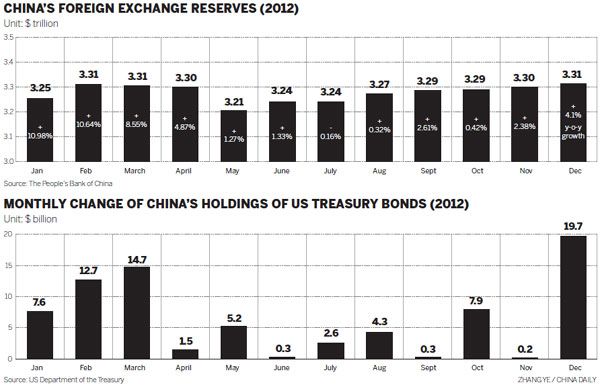
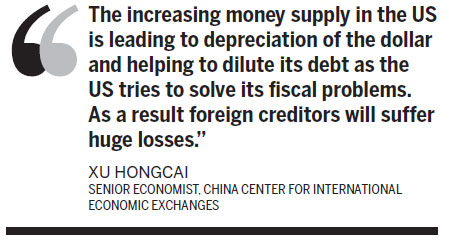

 Li Na on Time cover, makes influential 100 list
Li Na on Time cover, makes influential 100 list
 FBI releases photos of 2 Boston bombings suspects
FBI releases photos of 2 Boston bombings suspects
 World's wackiest hairstyles
World's wackiest hairstyles
 Sandstorms strike Northwest China
Sandstorms strike Northwest China
 Never-seen photos of Madonna on display
Never-seen photos of Madonna on display
 H7N9 outbreak linked to waterfowl migration
H7N9 outbreak linked to waterfowl migration
 Dozens feared dead in Texas plant blast
Dozens feared dead in Texas plant blast
 Venezuelan court rules out manual votes counting
Venezuelan court rules out manual votes counting
Most Viewed
Editor's Picks

|

|

|

|

|

|
Today's Top News
Boston bombing suspect reported cornered on boat
7.0-magnitude quake hits Sichuan
Cross-talk artist helps to spread the word
'Green' awareness levels drop in Beijing
Palace Museum spruces up
First couple on Time's list of most influential
H7N9 flu transmission studied
Trading channels 'need to broaden'
US Weekly

|

|
